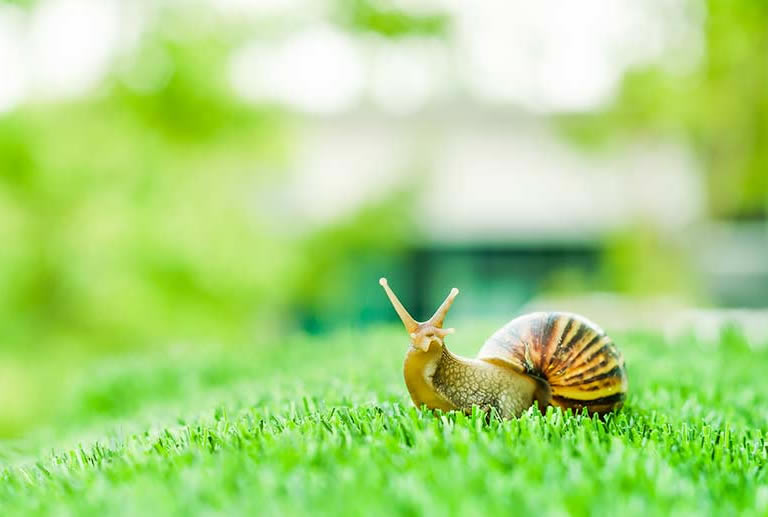Snails come in different shapes and sizes and are a normal part of our natural world. But after having cultivated a garden or lawn it can be a bit daunting to see lots of snails slithering about around your plants. What do this little creatures do to your plants and grass? Are snails good for the garden? Or, are they bad for the garden?
Table of Contents
- Are snails a friend or foe to your garden and plants?
- Telling the difference between good snails vs bad snails
- Snails and their diseases can affect both plants & humans
- The toxic relationship between snails and your lawn
- Snails like nothing more than munching on your plants
- Snails just love vegetable gardens
- How to deal with snails in the garden
Are snails a friend or foe to your garden and plants?
Snails can be either good for your garden or bad for it depending on the type of snails involved. Likewise, the type of garden the snails are in will also effect the type of effect they have on it.
Common brown snails are bad for your garden.
Although they prefer eating dead organic matter, and excrete beneficial nitrogen and nutrients into the soil, they will treat live plants as a food source. In some cases brown snails can carry diseases harmful to humans.
Decollate snails are good for the garden as they eat brown snails and slugs, but do not attack plants.
Snails slithering around on a lawn that has no plants will not cause as much damage as those same snails chomping on your cultivated garden plants or fruit and vegetable garden.
There are also two distinctive types of snails, one that can help your lawn stay clean while infusing the soil with beneficial nitrogen and nutrients and another that will eat its way through your garden leaving carnage in its wake.
Before we look at the effect these different snails have on the garden let’s first look at the two different snails you will likely see in your garden.
This will help you to see which particular one you have in your garden, which one you do not want in your garden and which you can can even consider adding to your garden.
This way you will be able to determine if you need to take action to eliminate the snails or not.
Telling the difference between good snails vs bad snails
There are two types of snails you will likely find in your garden. They are:
- Brown snails.
- Decollate snails.
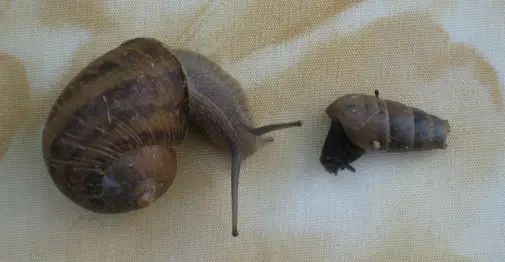
Let’s take a closer look at these two snail types to see how they effect gardens.
Brown snails are not plant-friendly
Brown snails are the most common type found in gardens.
They are not garden-friendly and can ruin years of hard cultivation by eating their way through your garden plants, vegetable and fruits or even destroying the plants completely.
Although brown snails do prefer eating dead leaves and other dead organic matter, they will happily chew through your garden plants when nothing else is available.
Brown snails will climb up plants to access new forming leaves, bark and fruit.
Brown snails are easy to spot as they are the larger type of snail and have a shorter shell than the decollate snail (see image above).
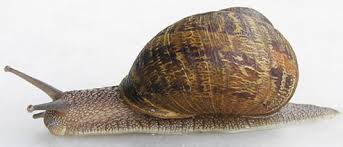
The brown snail is the type of snail that you do not want to have in your garden! It is a pest.
Decollate snails can help reduce brown snail numbers
Many gardeners will introduce the decollate snail to their gardens to help reduce the brown snail population.
Although this can be effective, and offers other benefits such as adding nutrients to the soil, unfortunately this is not a one-stop-shop solution to a brown snail problem.
Decollate snails are much smaller than brown snails and although they will fed on them they are unable to completely control the brown snail population.
They are an effective solution though when used in conjunction with other organic approaches as I will outline latter.
As well as helping to control brown snail populations and excreting nitrogen and nutrients into the soil there is more good news when it comes to decollate snails.
These little creatures will also readily feed on another garden problem – slugs!
For maintaining brown snail populations to low, nondestructive, levels and for eliminating slugs, decollate snails are a great solution.
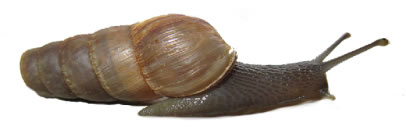
Introducing decollate snails into a snail infested garden will help to control the spread of brown snails and slugs.
However, you will need to take additional action to solve the problem beforehand as I cover below.
Snails and their diseases can affect both plants & humans
Although not all snails are hosts to disease it is possible for snails to carry some very harmful diseases as far as plants and humans are concerned.
Common snails can carry diseases such as such as angiostrongyliasis, clonorchiasis, fascioliasis, fasciolopsiasis, opisthorchiasis, paragonimiasis and schistosomiasis, all of which are extremely hazardous to human beings.
These diseases carry a real risk for human beings and so it is advised that you only handle snails while wearing gloves.
Snails can also spread plant diseases should as powdery mildew, downy mildew, verticillium wilt, and various fungal and bacterial infections, all of which can have serious detrimental affects on your garden foliage.
Luckily, there is no need to overly panic though. Not every snail in the US, (or Canada and the UK) is infected with dangerous diseases.
These diseases are usually mostly evident in sub tropical counties.
However, the fact that snails can carry diseases is something you should be cautious of.
As I stated above, always wear gloves when handling snails in the garden.
The toxic relationship between snails and your lawn
The most common snail in the garden is the brown snail.
Brown snails love nothing more than munching on garden debris such as dead leaves and dead flowers.
Common brown snails can help to keep your lawn clean by eating up dead organic matter. They will also excrete very beneficial nitrogen and nutrients into the soil, thus enriching it by adding the building blocks for healthy and vibrant plants.
But, although this means brown snails are great for the soil, unfortunately they aren’t too good for anything else in the garden.
So although it may seem like a good idea to leave brown snails rooming around your lawn it is probably a better idea to remove them.
Snails like nothing more than munching on your plants
Snails may slither slowly in the garden, giving the impression that they are lumbering mollusks forever stuck to moving slowly over the ground, but the truth is that accessing juicy leaves on high plants, trees and shrubbery pose no problem to them at all.
But, are are snails good for plants or are they more of a nuisance?
Brown snails are fantastic climbers and they love to climb your plants to feed on its juicy leaves.
Common brown snails will climb plants, and even tress, to reach new leaves, bark or fruit which they will devour mercilessly.
Decollate snails are a different matter though.
Any decollate snails you introduce to your garden will not climb any of your plants and will only feed on slugs, brown snails and ground-level organic matter (usually dead leaves).
Additionally decollate snails will release the same nitrogen and nutrients into the soil as brown snails do, so they give the garden all the benefits without any of the drawbacks.
Snails just love vegetable gardens
We’ve seen that snails can cause havoc on lawns and will happily much away at the foliage of your garden plants, but are snails good for vegetables?
Just as common brown snails can cause a lot of damage to garden plants they can do just as much damage, or more, to vegetables and fruits.

Brown snails may release nutrients and nitrogen into the soil, which is very beneficial for plant, vegetable and fruit growth but the damage they cause well outweighs those benefits.
Decollate snails do a much better job.
They too will release beneficial nutrients into the soil while helping clean up organic debris and while simultaneously feeding on brown snails and slugs. Decollate snails cannot climb and remain at ground level meaning your new plants growths are safe.
How to deal with snails in the garden
It is best to deal with brown snails as soon as you spot them in the garden.
Although small snail populations will probably do more good, in the form of nutrient excretion into the soil, than bad, snail populations multiply very fast.
So what was initially a benefit some becomes a major problem. For this reason it is best to try to eliminate brown snails from the garden rather than trying to control their populations.
Readers of this website will know that I am a big proponent for an organic approach in all gardening matters.
No matter what the problem, if there is a an organic solution (which there always is) I will opt for that course of action first. It’s better for your plants, it’s better for you, its better for wildlife and it’s better for the environment.
However, I am also a pragmatist.
If the organic solution does not produce the desired results I will turn to a more 21st century product-based approach even if that involves the use of chemicals (always as a last resort though).
So below is the organic way to deal with snails (please use this approach first) and a more product-based way of dealing with the problem.
Organic snail control
I gave you four approaches to removing brown snails and slugs from your garden. They are:
- Using grit.
- Attracting predators.
- Introducing decollate snails.
- A hybrid approach.
Using grit
Adding gritty substances to areas of your garden where snails congregate, or feed, is one organic solution for a snail problem.
Grit-like substances that are harmless to the garden, animals and plants but lethal to slugs and snails are an excellent organic way of dealing with the problem.
Diatomaceous earth sprinkled around garden plants that brown snails are attacking will deter and kill them. Snails cannot move over gritty substances without sustaining lethal bodily damage.
As well as, or instead of, diatomaceous earth you can also use crushed eggshells or sand. However, I find that diatomaceous earth offers the least amount of hassle and works the best.
Attracting predators
You may also want to consider attracting creatures that are natural predators to the brown snail.
Although this is not an approach I like to use very often, as it removes the beneficial effects that decollate snails have on the soil (the predators will eat them too), it is a very effective remedy for dealing with slugs and brown snails.
Small garden snakes that are harmless to humans, like the grater snake, like to snack on brown snails and can quickly clean up garden.
Garter snakes are common all over America and can live in very diverse climate zones from Alaska to Nicaragua. So it shouldn’t be a problem attracting them into your garden.
Just keep in mind that if you attract garden snakes then they will also eat the decollate snails. Here is a resource for attracting snakes into your garden.
Introducing decollate snails
If you plan to only use decollate snails to control your brown snail problem then you will have to give them a helping hand – literally!
Decollate snails will not be able to rid you entirely of your brown snail problem.
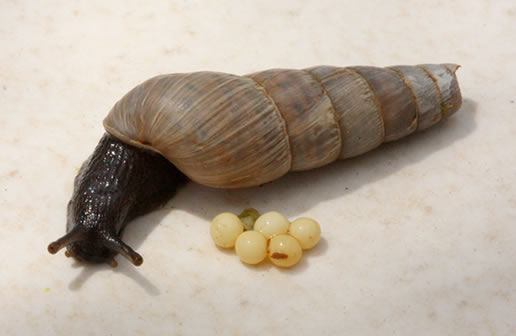
You will need to clean up your garden of as much brown snails as you can before introducing decollate snails to the area.
Snails are nocturnal so you will have to go out after dark and pick as may snails out of the garden as you can find.
Be sure to use gloves to avoid possible infection from disease.
Using a hybrid approach
If you do not want to remove brown snails by hand then you can use a product-based approach, as outlined below. Do this to remove the brown snails before adding decollate snails to your garden to maintain the brown-snail-free zone.
This is a hybrid approach to the problem where you use one solution to remove the brown snails and slugs and then introduce decollate snails to maintain pest population levels.
If you do use plan to use this hybrid approach then please be sure to wait at least 1 week longer than the product’s active ingredient lasts before introducing decollate snails.
That means, if you are using the product I recommend below you will need to wait at least 5 weeks after its application before introducing decollate snails to your garden.
If you have to buy decollate snails then be sure to introduce only a few and keep an eye on them over a few days before introducing the rest.
This will ensure the initial elimination product is no longer active and has not killed your new snails.
Using a chemical product for snail control
Be aware that if you go down a chemical route for controlling brown snails and slugs in your garden you will also kill any beneficial decollate snails that are there.
If this is a course of action that you are set on, or you plan to use a hybrid approach, then it is wise to use a fast acting and effective product that contains iron phosphate, like this one from Sluggo.
Iron phosphate products will usually remain active for 3 – 4 weeks.
They are safe for lawns, plant gardens and vegetable gardens and will not harm well kids, pets or wildlife that rummage about in the garden.
Sluggo works as bait to kill slugs and brown snails. The iron phosphate in the product is blended with snail and slug food additives and it is these additives that are eaten by the brown snail.
Once ingested the iron phosphate triggers internal changes in the snail that causes it a reaction which makes it stop feeding and seek a hiding place.
Once hidden the snail will eventually stave and die – usually within a week.
There are, of course, other types of solution for eliminating slugs and snail (like these ones) that work just as efficiently to clear your garden or lawn of these pests.
Personally though, I prefer using Sluggo (or similar alternative) over other solutions because it is just as effective as some the more chemically-rich approaches but is a much more organic solution.
Sluggo is listed with OMRI (Organic Materials Review Institute) as organic but just bear in mind that you are still adding a toxic agent (iron) to the garden. So in my opinion it is not as organic as the solutions I gave you above – but much better than spraying chemicals!

